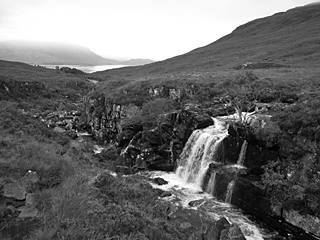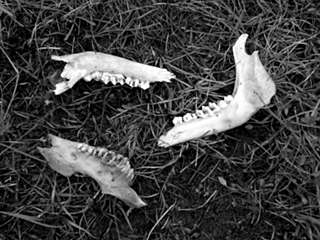| | 
- 24September 2002
- No. 5,986 (cartoon)
- This farce is interminable.
And then it just gets worse. 
- 25 September 2002
- The Scottish Breeze Above My Knees
- This is the fourth day I’ve spent walking up and down the Scottish Highlands with my pants unbuttoned and my zipper pulled all the way down. It’s the least I can do in lieu of a kilt.

- 26 September 2002
- Stupid Advice
- I’m enjoying a meal at a place called “Ben Damph” near Torridon. I chose the place because of its name. Since Celtic is a very foreign language, “Ben Damph” sounds like “Been Damp,” a fine and appropriate Scottish name indeed.
All the other tables are vacant; it’s very quiet until a young five- or six-year old boy sprints out of the kitchen and hides behind some chairs across the room. A few seconds later, a woman (his mother? the owner? a waitress?) follows in hot pursuit. “Stop being silly!” she commands as she grabs the boy by the collar. “Get off me!” the boy protests. They each repeat their respective positions as she drags the lad back into the kitchen. I’m worried about the child’s welfare. What if he gives in and takes the woman’s advice to stop being silly? I attribute my meager successes to my refusal to take stupid advice, especially ridiculous comments like, “Stop being silly!” 

- 27 September 2002
- The Missing Distillery
- I don’t know much about Scotland, but I’ve gleaned a bit from glancing at advertisements over the years. Scottish hill streams lead to Scottish distilleries, and that’s that.
At the mouth of every Scottish stream, colorful, old, bearded men work in quaint, old, brick distilleries. They filter out the sheep shit—but not the peaty goodness—from the hill water, then concoct it into whisky over a seven-year period. That’s where whisky comes from, innit? Perhaps not. Yesterday, I spotted a good-sized stream on the descent from Beinn Shenanigan. Since I was thirsty, I decided to follow the water to the distillery. I slogged through countless bogs and quagmires of mud, but when I finally reached the loch, all I found was more water. No colorful, old, bearded men, no quaint, old, brick distillery, no nothing. I’ve been had! Curse those swarthy Scots and their humbugging advertising henchmen. 

- 28 September 2002
- Feral Sheep Attack
- This morning, I witnessed an incredible sight in the hills above Loch Maree. I was sitting on a promontory when I saw a pack of seven sheep chasing a sheep dog up the small, narrow canyon below me. The sheep ignored the dog’s barks; these were feral sheep. The dog had evidently confused these vicious, wild sheep with their docile, domesticated relatives. I’m fairly sure that the dog realized even then that she had made a fatal mistake.
The sheep marched purposefully; they knew their prey couldn’t escape. The dog was helplessly cornered, and she knew it. She barked, yelped, growled, and whimpered, but the sheep kept advancing. Finally, the largest ram lowered his head and charged. As soon as his horn entered the dog’s abdomen, the ram jerked his head back. The dog sailed a couple of meters into the air, then smashed hard against a rock wall. The other sheep were waiting by the time she slid limply to the ground. The dog couldn’t have lived long; she probably died as soon as one of the sheep bit through her throat, almost severing her neck. From my vantage point, all I could see was a frenzy of bloody sheep and ragged scraps of sheep dog. Later, I came across three sheep jaws in an abandoned hunter’s camp. The pointed, serrated teeth looked even more vicious than I’d imagined. The unfortunate dog couldn’t have suffered long. I stopped complaining about the weight of my forty-five. Suddenly, the pistol didn’t feel like extra weight while hiking in feral sheep country. 
- 29 September 2002
- William Topaz McGonagall
- William Topaz McGonagall, arguably Scotland’s second most famous poet after the Great Chieftan o’ the Puddin-race, died one hundred years ago today.
According to The Scots Magazine (“For people who love Scotland”), “in 1889, twelve years after the muse first visited him, the [Dundee] magistrates banned William from all further public performances on the grounds that his poetry readings were inciting the local citizenry to such hooliganism and rowdyism as to give the city a bad name.” Here’s McGonagall’s rejoinder. Fellow citizens, I consider such treatment to be very hard;
’Tis proof for me that they have little regard;
Or else in the circumstances they would have seen to my protection;
Then that would have been a proof of their affection,
And how genius ought to be rewarded.
- I have to agree with McGonagall that he’s a genius; who else could get any sort of reaction—let alone a powerful response—to something as limp as poetry? (I am, however, somewhat skeptical of the claim on McGonagall’s business card, “Successor to William Shakespeare.”)
History has not remembered McGonagall kindly. Take this entry from Chambers Biographical Dictionary: “His poems are uniformly bad, but possess a disarming naiveté and a calypso-like disregard for meter which still never fail to entertain.” I’d wager McGonagall would have preferred bad press to no press at all; most shameless self-promoters do. 
- 30 September 2002
- Schloomph, Phrisch, Schloomph, Phrisch ...
- I’m south of the Scottish border, but I nevertheless find myself talking about my recent trip to a Scot named Angus in a Gateshead pub, “Her Indoors.”
“If you could still be in bonny Scotland, then why are ye here with these bampots?” Angus inquired. I probably should have asked him the same question, but instead I decided to give him a truthful—albeit convoluted—answer. “Did you ever see The Bloody Dawn of the Avenging Lepers?” I asked. “Aye; I most certainly did,” Angus replied. “It was the only thing playing in the theaters in all of Aberdeen during the winter of seventy-nine.” “Do you remember when the guy’s car broke down and he took a shortcut through the graveyard in the rain?” I continued. “He ended up running across hundreds of corpses in the dark. And remember that each time his foot sank into someone’s decayed chest, it went schloomph, and every time he pulled it out it went phrisch?” Angus slapped his knee, snorted, and laughed; of course he remembered. Who could forget such a wonderful example of the filmmaker’s—and the Foley editor’s—art? “Well, that’s what hiking through Scottish bogs are like,” I explained. “Schloomph, phrisch, schloomph, phrisch, schloomph, phrisch, schloomph, phrisch. Muck, in the rain, in the dark.” “Aye, you’re just a big, wee pansy,” Angus replied. “If you’d ever get clagged in I bet you’d drop pellets.” I didn’t know what to say. I couldn’t figure out how anything could simultaneously be big and wee, or what “clagged in” meant. There are some parts of Scottish culture that will remain a mystery. 
last weak | index | next weak
©2002 David Glenn Rinehart
| |

